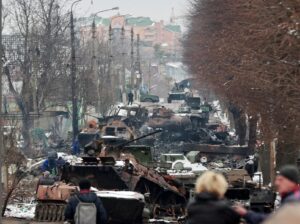 I’m no foreign policy expert. Nor am I willing to foist my prejudices about the Middle East on you. They’re worth no more than the bits they’re printed on.
I’m no foreign policy expert. Nor am I willing to foist my prejudices about the Middle East on you. They’re worth no more than the bits they’re printed on.
Instead, I want to focus on what I know, technology and economics.
There’s an assumption right now that the current conflicts are good for the markets. The Ukraine War has cost the U.S. 5% of its military budget, most of which went right back to our military industrial complex. In exchange it destroyed half the Russian military. We’re told this is a good deal.
Wall Street hasn’t reacted much to Gaza, either. There’s an assumption that Israel has things in hand. There’s an assumption the President can keep the war from widening. There’s a belief that oil prices will remain level and that economic analysis should focus on what’s happening here.
Most of these assumptions will turn out to be wrong.
War is unhealthy for economies and other living things. That’s just a fact. The period from 1929-1954, the most war-torn period of the last century, is also called the “Great Compression.” That’s because the wealth gap narrowed a lot. Rich people in 1954 weren’t that rich. Not compared to their families before the Crash. Their wealth was blown up or taken by the government, to pay for the blowing up. The average Joe and Jane, if they made it through, did get to taste the technology created during the crisis, including the birth of computers. But there was a lot of PTSD around. Every boomer grew up in it.

Then there’s technology. Just as with World War I, the Ukraine War has changed how war is fought. Tanks and infantry are as outdated as cavalry became then. Now it’s all about drones and long-range artillery on one side, with mines, and tank traps, on the other. Again, as in WWI, both sides are being worn down behind their lines. The question is whether western aid or Russia’s economy will collapse first.
There are no such questions in Gaza. It’s a far more one-sided war. Israel can do what it wants. The only weapon Gaza has ever had are babies. But that’s a potent weapon. Killing babies turns out to be unpopular.
What will be the economic effects of all this? I can’t see them as anything but negative. Extremism leads to extremism, and death to death. When you see other people slaughtering each other, it’s easy to want to join the party. Americans have stopped talking to each other and have started seeking to use government against each other. That’s what war is. It never ends well for the people involved, only the survivors.
In the wake of any war, meanwhile, there’s again a lot of undiagnosed PTSD. We will see it in the Middle East, and we’ll see it in the United States. Maybe the relative apathy of young people is a form of pre-PTSD. Seeing their elders engaged in murdering each other, people in their 20s and 30s just want to survive. That attitude makes a lot more sense than what anyone over 40 is doing right now.










